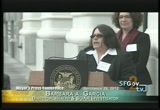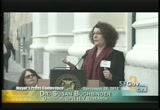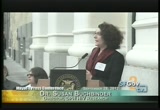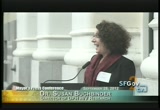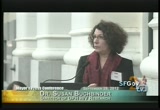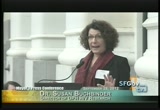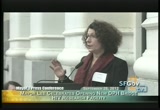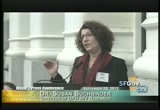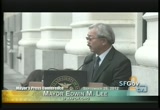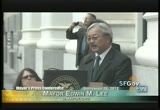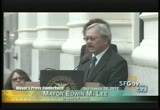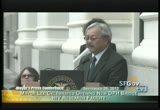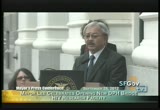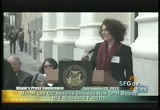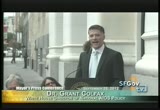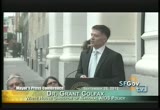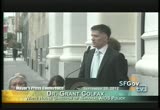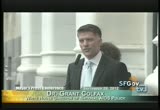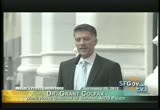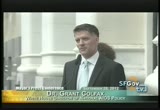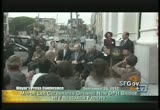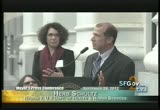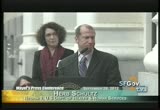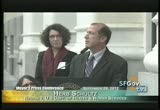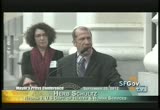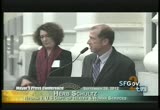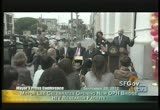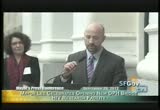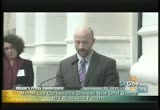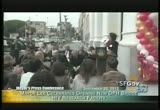tv [untitled] November 7, 2012 11:00pm-11:30pm PST
11:00 pm
and one of those incredible staffs is going to be susan [speaker not understood]. [cheering and applauding] >> susan is a premiere doctor in our community, in our san francisco general hospital focused on hiv and aids. ands as importantly and sometimes even more, her importance of being a researcher in the area of hiv and aids and is a renowned world leader in this area. by the way, we have many of you who are, well, world renowned researchers also in the midst of all of us. i'm the principal investigator on this project and that means that i'm supposed to be in charge of making sure it happens. so, we're 70% done and you're seeing one of the major parts of it today. and i want to introduce susan so we can get the show on the road. so, thank you so much. (applause)
11:01 pm
>> well, i want to welcome you all here today for the launch of our state offices aids renovation project otherwise known as soar. and i'm susan buck binder. i'm speaking on behalf of the entire aids office. we are fortunate to be a world class research organization housed within the health department which is pretty much unique globally. we have three amazing sections that we work with. the first is the surveillance epidemiology section. they really started at the very beginning of the hiv epidemic in tracking what was then known as grid and other term and became aids and then also tracking new cases of hiv infection. and, so, there's really been leaders around the world in how to track trends in new infections and that is what helps us drive both our prevention and our treatment
11:02 pm
program. they share their data around the world. they are leaders in helping other organizations around the world set up their own surveillance group. this was led by dr. susan sheer and dr. willie mcfar land and i want to acknowledge them and their entire team. (applause) >> the hiv prevention section formerly led it now it's led by tracy packer who is here in the crowd. (applause) >> and stacey leads an amazing team of people. they not only oversee and set the priorities for hiv prevention in the entire city and serve as really, again, one of the flagship prevention programs globally in making decisions about how to have the biggest impact on driving down
11:03 pm
new infections. but they're also a world class research organization that does research on testing, on linkage to care, community viral load, treatment of substance use as a way to prevent new hiv infections. and she, again, has a very difficult verse and very talented team and we're really excited to work with them as well. (applause) >> and then finally i want to introduce my staff. we were formally known as the hiv research section. but as you can see we have these other world class research organizations housed in our same institution. so, we've renamed ourselves bridge hiv. and i'm going to tell you a little story because i have sitting here. we got a grant from the tap root organization, which is a group that does pro bono work for nonprofit organizations in a variety of areas. and tim led two of our
11:04 pm
projects, one of which was to help us rename ourselves because we knew that it was confusing for us to be called the hiv research section when so many of us do research. we are called bridge hiv because we're a bridge to the east bay, to our international collaboraters, from the past, the very beginning of the epidemic when there was a research study called the san francisco clinic city cohort study or the hepatitis b cohort study, that specimens from is that study were used to develop the very first hiv antibody test to where a link to the past and the future. so, we're a link to the past and the future, and more than anything we're a link to the community. and our motto is where science meets community. our team does really cutting edge research on different kinds of prevention strategies, pre-exposure prophylaxis. and if you go to our website, join prep hiv, you'll see all
11:05 pm
of the many exciting studies that we have as well as our partnership with san francisco city clinic in launching the first demonstration project of pre-exposure prophylaxis, taking antihiv medicines to prevent new infections. we're studying topical gels, retro microbicide. the way we're going to end this epidemic is through a vaccine, we've controlled other infectious diseases through a cure. we're proud of our staff who contribute to this as well as the many study participants. and i'm just going to close with a quick word about the project. the way that this project came about was actually one of our staff members, janey vincent who is our graphic designer, you'll see some of her beautiful work inside, noticed that there was -- she's hiding. (applause)
11:06 pm
>> she noticed that president obama had designated part of his stimulus money to nih for the national institutes of health and they were putting a billion dollars to research infrastructure, biomedical research infrastructure, something that's never happened before. she said, you know, we don't have enough space in our section. all of the three units had grown so much that we really needed more space. she said, do you think we could apply for this money? and, so, the three units came together and our goals were one, to be able to fully really advance the science that we're doing by enrolling large diverse groups of study participants and we didn't have enough room to do that. the second was that we wanted to increase the space that we have so we could share collaboratively so we could work together with each other.
11:07 pm
and the third was really to engage with community. and we didn't have a large community space on-site. and, so, you'll see the space, see the additional clinical space that we've added. you'll see the additional rooms that we've added for conferences, formal and informal gatherings to staff as well as video conferencing capabilities for a greenway of communicating with our colleagues globally. and then finally, we're going to have a very beautiful, large community stage, it's that stage of the construction is not complete but you'll get a chance to see the status of that. so, again, i want to thank you all. and i now want to welcome mayor ed lee. we're so proud to have mayor lee here to be in the city led by mayor lee. and, again, none of this could happen, none of our activities could happen without the support of the city. that's what makes us such a unique organization. it's what -- we've always had such strong support from the city. so, mayor lee, thank you. (applause)
11:08 pm
>> thank you. thank you, susan and barbara, and thank you all for coming out today on this ribbon cutting on a very, very important center of research. we have never given up on this fight to end aids, and i am so thankful to be working with supervisor scott weaner and supervisor david campos and the board of supervisors. and we have through the budget year in and year out, and particularly this last couple years, where state and federal funds may have been waiting. we stood up and said, we are continuing this fight at the highest level to make sure we fund everything we can to end this aids epidemic. you know, i've been in the city working and the numbers came out. there were 20,000 people that died of this dreaded disease. there were over 20,000 people, more still are suffering from
11:09 pm
the aids epidemic and we need to find those cures. and, so, today is a delightful day because it is now again a part of the innovation spirit of this city that we create the clinical resources that we need, the laboratories that we need to invite the doctors and the researchers to come here and help us discover the latest efforts and to make sure we continue that progress. and i'm here today to thank a lot of the people that include dr. buck binder and barbara and the wonderful health commission that has been working, but also just a few years ago, if you saw what the center was -- and i used to work in this building at the top level, a barbecue up front of all placeses, a saloon, people used to wear their boots to have the greatest barbecue they could have. and working that out with the
11:10 pm
hiv unit and research of our public health, working with our real estate, working with our department of technology and our city administrator. but ultimately working with our department of public works and mohammed at the helm, making sure this got done on time within budget, having the architects and engineers under [speaker not understood] working with the expert laboratory folks from dph and the hiv clinic to make sure that we did it right. because the laboratories have to meet federal standards. but i think also a great kudos has to happen to our partners, both locally, regionally, and the federal government. we could not have done this without the 9-1/2 million dollars of recovery monies that we got through the federal government. we have herb schultz here from the department of human
11:11 pm
services federal government. they've been really at the forefront with us. certainly dan bernel representing leader pelosi. she has been really a stalwart fighter. when everybody was cutting funds, she preserved that money for us. and, of course, i've got to put out a big, big thanks to president obama because without that recovery money, we wouldn't be here talking about this today. so, thank you, president obama. (applause) >> and leader pelosi, federal partners working with our local folks here. that's how we get these things done. and then i want to just give a special shout out to dr. colvax who is here. i know he gave such you an incredible dedication when he was the head of the hiv unit while he was here. we're changing stories now that he's at the head of the national office on hiv policy and the national policy office. how wonderful he thinks of san
11:12 pm
francisco now and he has to go and interact with washington. (applause) >> they probably talk about that in a minute. but everybody that i know that ever has to go to washington, d.c. or any other place, that they came from san francisco. we know what they're doing here. we know we have a strong partnership and it's community-based agencies also that are helping make this connection because our residents and the people with aids wouldn't trust us if we didn't do it the way in which we collaborated so strongly with our neighbors, with our residents and our community-based agencies, with all of the different agencies that are represented here. and i am privileged, very, very privileged to thank all of the partners here today to have 17,000 square feet of research space that will be used to its utmost to join in discovering the latest drugs, the latest prevention cures, to have a
11:13 pm
safe place for people who have contacted and been victims of aids to come here and tell us what's going on in their lives. help us help them help the rest of the world figure this out. this is what san francisco does. i am very, very proud of everyone who participates in this high level of interchange. so, again, thank you very much and i look forward to these great discoveries that we'll have. thank you, san francisco, for being a great place. [cheering and applauding] >> thank you, mayor lee. and in addition to the stimulus money that we have to thank president obama for, we also have to thank him for his wise choice of the director of the white house office of national aids policy, dr. brad colfax. [cheering and applauding] >> well, good morning, everybody. isn't the fog great? [laughter] >> after spending the summer in
11:14 pm
d.c., i can say i will never, ever be critical of fog again. [laughter] >> and as many of you know, i had the privilege before going to the office of national aids policy in d.c. to work for the health department for 15 years under barbara's inspirational leadership and susan's incredible mentor ship and supervision. it's just been fantastic to go to d.c. and realize what incredible history and progress san francisco has and continues to make and help guide us at the national level in terms of the epidemic. today the celebration of bridge research is just another step forward, a huge step forward in the city's remarkable leadership at the local, national, and international level in hiv prevention care and treatment. and the bridge research team, the history has just been remarkable in terms from the
11:15 pm
early days of the epidemic, in terms of the natural history of the disease, vaccine research, prevention measures, prophylaxis, treatment, testing technologies. as susan was saying, bringing this all together was integrating with surveillance work, with prevention work, and with community-based organizations. and this is really the san francisco model that really resonates in terms of how we approach the epidemic. the research is eloquent, it's rigorous, and it involves community at all levels. and that is something i think we really need to celebrate about what bridge research means today. so, at the office of national aids policy, our job is to implement the president's national hiv/aids strategy. the president released the strategy two years ago. this is the first strategy for the -- first comprehensive strategy for the united states since the first epidemic.
11:16 pm
it has three main health outcome goals, to reduce hiv incidents, to improve health and wellness outcomes for people living with hiv, and to reduce hiv-related disparities. i'm sure that sounds familiar to many of you because that's certainly aligned with many of the san francisco's efforts. the fourth goal is to develop a more comprehensive coordinated response to the epidemic nationally and this is something that we really have been working on at the federal level and also bringing forward the state and local responsibility in terms of how we address this epidemic. and i just want to really acknowledge the mayor's support at the local level, making sure that federal, state and local resources are brought forward to address this epidemic and it is something that we are really committed to as we move forward, continuing to implement the strategy. and we have our work cut out for us.
11:17 pm
at the entertioner international aids conference in july this year, the cdc reported that only 25% of people living in the united states with hiv has a suppressed viral load. so, only one quarter of people have reached outcomes that we really know is so important for people to live healthier lives when they're living with hiv. the 25% is really of concern. and when you look at the disparities in hiv, those numbers are even more concerning for people of color. so, as we move forward to health equity, our focus is really how do we help people access testing, how do we help people access care in their communities. and certainly while these numbers are something that we would all like to see higher, we think there is a huge opportunity, transformative opportunity to move forward in improving these as a nation and that is the affordable care act. and i just want to acknowledge herb and his work and hhs's work in implementing the affordable care act under the
11:18 pm
outstanding leadership of secretary sebelius. some of these numbers are so big it is hard to wrap your mind around. affordable care will increase coverage for 30 million more americans. (applause) >> just incredible. and that includes, that includes tens of thousands of americans living with hiv, tens of thousands of americans living with hiv will be able to access comprehensive health care, medications, and hiv testing. and there are so many different aspects of the affordable care that will directly benefit people living with hiv. one of them i want to point out as a reese -- recent provider myself, people with hiv cannot be prohibited. (applause) >> i work with many of you in this audience. how many conversations have we had with people saying i don't want to get tested right now. i don't have insurance, i'm afraid i'm going to lose my
11:19 pm
insurance. this is transformative. san francisco figured this out a while ago, the comprehensive health care really makes the difference not only at the individual level, but for increasing community health and wellness. so, again, a real signal -- real shout out to san francisco for your leadership. and a real signal to how we can potentially move forward as a nation. so, thank you. so, san francisco has been a model city for over 30 years in hiv prevention care and treatment. we look forward to working with you at the national aids policy. we are going to continue to do a lot of outreach, conversations, figuring out how to bring the community voice to the federal level. it is always helpful for us to remind ourselves what have we done today to prevent new hiv infections. what have we done today to improve somebody's life living with hiv. and we know to recognize and to realize the present vision of an aids regeneration, we need to continue to build more bridges, which is like this. so, thank you very much and
11:20 pm
congratulations. (applause) >> thank you, brandt. next i'd like to introduce herb schultz who is the regional director -- regional 9 director of the department of health and human services. come and speak to us. thank you. (applause) >> hi, region 9 u.s. department of health and human services. [laughter] >> it's a mouthful. it is a real honor and a pleasure to be here with you this morning. and first off, i want to ask you all to give yourselves a round of applause for the leadership of this community and of san francisco and the bay area and california broadly. (applause) >> you know, it's an honor to get up here and represent my
11:21 pm
boss, secretary kathleen sebelius and be like brandt colfax, another round of applause for dr. colfax, please. (applause) >> to have a reinvest and recovery act, our stimulus law with the leadership of leader pelosi, of our mayor, of our supervisors, and our community to have $9-1/2 million given to this city and to this area for this. but not just for this, but everybody's already setting this this morning, the local impact, the state impact, the national impact, and indeed the international impact. and i represent a region that is 50 million people. california, arizona, nevada, hawaii, it's a three territories and three countries in the pacific. and i could tell you that i
11:22 pm
have moved around my region. i've been working with the hiv/aids and other communities throughout our region. do you know how many people have said to me, i got my information through san francisco? (applause) >> that is something to be really proud of. you know, i'll tell you a little bit of a personal story as we -- i move on. imagine september 16th, 1991, your young 29 year old, gay man living in washington, d.c., fulfilling your dream to be a lobbyist. and your physician calls. hi, sam. hi, herb. imagine i had hair, i had very curly hair. [laughter] >> and bill wilson has pictures of it and i know he's here. and he said, herb, i think you ought to come to my office. and i said, why?
11:23 pm
and he said, because, you know, you had some tests recently. i know, i had the flu, i came in, i did some tests. what's up? you need to come to my office. and these are the pills. and a week-and-a-half ago sunday, september 16th, 2012, as i sat in the synagogue during rosh hashanah services with my partner of 14 years, i reflected on the fact that that was 21 years ago. and even though i was active in the community, i turned to my friends in d.c., we didn't have the internet. remember that, anyone remember that? i see young people here. you don't know what that's like. think of a world with pink messages and no voice recorders. and i said, we have great resources here and i want to go and i want to talk to people, but where do you find the best
11:24 pm
research? because at this point in time we're talking about 1991. there wasn't the poet east inhibitors i have in my pocket. there wasn't anything but azt. i can't even say the word any more, bactrim. i'm not a provider, as you can tell. how many times do we reflect every day about the people that we lost and what emboldens us today is that this world class research institution is not only saving lives by treating, but it's coming up with revolutionery cutting edge prevention techniques. and i'm very proud to work for the obama administration, for secretary, as grant said, that has not only focused on treatment and research, but
11:25 pm
prevention in so many things. and, so, my story is not unique. but on behalf of the obama administration, on behalf of secretary kathleen sebelius, i'm here to say thank you for the work of san francisco and the local, at the state, and at the national/international level has done for more than 30 years that have saved lives, that have built commutes, that have allowed families to come together and grow. because this is not 1981. it's almost 2013. and this place is revolutionery and this 9-1/2 million will continue to make it the pinnacle of world research and prevention on hiv. so, thank you very, very much for having me here. (applause)
11:26 pm
>> i just looked over my shoulder and here is dr. george rutherford, director of the aids office when i came here many years ago. we have many generations of individuals who work and contribute to the work we all do here. next i'd like to introduce dan bernal who is the district director under house democratic leader house pelosi and is going to speak next. thank you. (applause) >> thank you. thank you, dr. bookbinder. great to see so much leadership here including the aids foundation marking its 30 years leadership fighting the prevention of hiv/aids this weekend. of course judy auerbach, we're thankful for grant colfax working in washington entrusting him with aids polecy. every time hiv/aids is threatened for san francisco, mayor ed lee comes to washington.
11:27 pm
he walks the halls, he commands the attention and respect not only of leader pelosi, but everybody that's necessary to help save what we need here in san francisco. so, thank you mayor lee for your leadership as well. (applause) >> leader pelosi couldn't be here today, but she asked me to share some words with you from her, which i'll do now. dear friends, thank you for invieedthing me to participate in the official ribbon cutting ceremony for the san francisco department of public health's new bridge hiv research facility. while i am unable to be with you in person, i joan you in celebrating the opening of the state-of-the-art research center which was constructed with federal funding through the national institutes of health and the american recovery and reinvest act. i would like to recognize two outstanding leaders in our fight against hiv/aids. your executive director dr. susan bookbinder and director of public health barbara garcia. also please join me in thanking mayor ed lee for his leadership in assuring that san francisco ans living with hiv/aids continue to have access to the
11:28 pm
care they need. (applause) >> the fight against hiv/aids has been one of my top legislative priorities for 25 years. as one of the earliest and hardest hit cities, san francisco has also been at the forefront of responding to the crisis of hiv/aids. from our community-based system of care to the cutting edge research at ucsf. working together we apply san francisco's model on a national scale with the creation of the ryan white care act, housing opportunities for people with aids and the national aids strategy. now with the passage of the affordable care act, we will ensure that everyone including hiv patients has ensurance of the ability to afford lifesaving medications. with the addition of the federally supported bridge hiv research facility, our city will continue to lead the way as we strive for better treatments, a vaccine, and finally a cure to the scourge of hiv/aids. i will continue working in
11:29 pm
congress to ensure our nation investments in research and medical advances based focused on new treatments, care, prevention, and early intervention and expand housing opportunities and end discrimination for people with hiv/aids. thank you again for your leadership and best wishes for a memorable ribbon cutting ceremony. best regards, nancy pelosi, democratic leader. thank you. (applause) >> thank you. and we are again so happy to have our federal representatives, our state representatives, and i am next going to introduce commissioner chow who is with our health commission. on the local level we have tremendous support and tremendous innovation. (applause) >> thank you. and i am indeed privileged to be here on many levels. and there's been
122 Views
IN COLLECTIONS
SFGTV2: San Francisco Government Television Television Archive
Television Archive  Television Archive News Search Service
Television Archive News Search Service 
Uploaded by TV Archive on

 Live Music Archive
Live Music Archive Librivox Free Audio
Librivox Free Audio Metropolitan Museum
Metropolitan Museum Cleveland Museum of Art
Cleveland Museum of Art Internet Arcade
Internet Arcade Console Living Room
Console Living Room Books to Borrow
Books to Borrow Open Library
Open Library TV News
TV News Understanding 9/11
Understanding 9/11